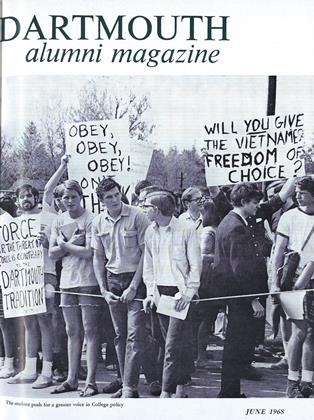Before the current wave of heart transplants, cardiologists worked for decades behind the scenes on the various phases of clinical investigation that had to precede the surgery. DR. WILLIAM LIKOFF '33, Professor of Medicine, head of cardiology, and director of the Cardiovascular Institute at Philadelphia's Hahnemann Medical College and Hospital, was eminently involved in these planning stages.
Though a medical doctor, not a surgeon, he emphatically believes that the internist should not be reluctant to accept the surgeon's "promise of an efficient mechanical answer to what in the final analysis is a mechanical problem."
An honest, articulate man, he is reticent to claim credit as an innovator. But his fellow cardiologists honored his abilities by electing him last year's president of the American College of Cardiology.
Recently he was featured on the cover of Modern Medicine, published fortnightly for the nation's 200,000 physicians in private practice. Dr. Likoff is himself senior editor of Diseases of the Chest and a member of the editorial board of The American Journal of Cardiology and of the editorial advisory board of the Cardiac Compendium.
Heart disease, as is commonly known, is the number one killer and, as is less known, causes more deaths than the next three killers combined: cancer, infection, and traumatic death.
"There are about one thousand new cases a day," according to Dr. Likoff. He adds that heart disease is on the increase. "Some of the current theories blame stress and diet."
A heart attack victim himself in 1956, he is very much aware of "helping the physician understand in scientific terms the 'Morse code' of what the patient's signs and symptoms are expressing and the different categories of disease represented by this code." One of his maxims: "The physician must learn to recognize and, in recognizing, understand."
He is perhaps as well versed as any practicing cardiologist on the progress and problems of heart disease. A 1938 graduate of Hahnemann, he interned and did his residency at Philadelphia's Mount Sinai Hospital and held a cardiac fellowship at Boston's Peter Bent Brigham until he joined the Army in 1943. Major Likoff headed the cardiovascular section of the 51st Army General Hospital and toured New Guinea and the Philippines for three years.
Since World War II he has been at Hahnemann where the basic direction of his career was determined by his early experience on the team of Dr. Charles Bailey. Dr. Bailey was the first to perform intro-cardiac operations on rheumatic hearts. His team made important discoveries on the physiology of the heart and was probably the first cardiovascular group in the country organized along multidisciplinary and "categoric" lines, in contrast to other collaborations which were surgeon dominated.
Dr. Likoff spends about a third of his time teaching. In all student training he insists on the intensive matching of clinical and laboratory findings with the anatomy of the patient. According to Modern Medicine, he is concentrating on the "correlative" tasks involved in making bedside medicine a better science.
Notably outspoken, he has criticized today's medical schools, saying they are "schools of technology, not centers of higher learning; they are really no better than TV repair schools." He charges that the segmented medical school curriculum is disruptive in its walling off of the basic sciences from the rest of medicine, overly conservative in its refusal to admit additional sciences that have matured since the original program was set, and inappropriate in its increasing attention to the minutiae of steadily enlarging factual knowledge regardless of its applicability to the goal at hand.
But he excepts Dartmouth Medical School and praises Dean Carleton Chapman for taking steps to prepare students for a lifetime of accumulating and evaluating new information and putting it into proper perspective.
 View Full Issue
View Full Issue
More From This Issue
-
 Feature
FeatureRETIRING FACULTY AND STAFF
June 1968 -
 Feature
FeatureThe Black Student at Dartmouth
June 1968 By Wally Ford '70 -
 Feature
FeatureVox Clamantis 1968
June 1968 By Chris Kern '69 -
 Feature
FeatureFour Steps Forward in Biology
June 1968 By PROF. RAYMOND W. BARRATT. -
 Feature
FeatureShark Authority
June 1968 -
 Feature
FeatureWinner at Aqueduct
June 1968
Features
-
 Feature
FeatureThe Spoil Sport
Mar/Apr 2008 By Brad Parks '96 -
 Feature
FeatureMan's Aggressive Nature
February 1955 By GEORGE E. GARDNER '25 -
 Cover Story
Cover StoryBack on the Wall (where they belong)
SEPTEMBER 1985 By Georgia Croft -
 Feature
FeatureSteady State
September 1976 By Pierre Kirch -
 Feature
FeatureA Basic Classical Library
January 1960 By PROF. ROBIN ROBINSON '24 -
 Feature
FeatureSTEVE KELLEY IN TWO ACTS
APRIL 1991 By ROBERT ESHMAN '82

